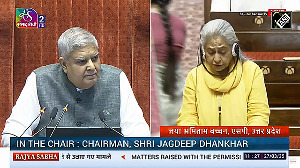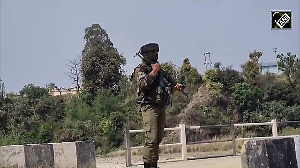When Dr Verghese Kurien's dream of creating and leading a world-class rural management institute in the country through the Institute of Rural Management Anand left him disillusioned, the veteran reformer turned to a university in Orissa to carry forward his vision.
A year later, the university he backed, the Kalinga Institute of Industrial Technology's School of Rural Management at Bhubaneshwar, is quietly making plans to outdo the institute it was modelled on.
Unlike IRMA, which offers a two-year Post Graduate diploma in Rural Management, KSRM will be able to award an MBA in Rural Management to the first batch of 72 students passing out in 2009 owing to its deemed university status.
The institute has also received the All India Council for Technical Education approval for increasing the number of students from 74 to 100-120 for the second batch of students in 2008.
LK Vaswani, who taught at IRMA for 16 years and is now the director of KSRM, says the new institute retains the IRMA model of building and sustaining a partnership between rural people and committed professional managers.
But according to Vaswani, a key element that separates IRMA from KRSM, is the lack of inhibition towards its students choosing to work with the private sector.
Although over the years, IRMA has softened its stance towards corporate companies with development and rural positions, there is an unsaid rule that the institute has and will be a place for rural managers.
"KSRM has decided to avoid taking a sectoral association. We do not believe in having any inhibitions towards the corporate sector considering more and more of them are entering the development sector. In fact, we are associated with the private sector where our students can have hands-on experience in agri-business, Corporate Social Responsibility, NGO management, finance and the like," says Vaswani.
He added that in terms of on-the-field education or experiential learning, the institute hopes to surpass all other rural management schools.
For starters, the institute will hold live field training modules for a duration of 12 weeks which will be conducted thrice a year. The first batch of 72 students from 16 states will be asked to go back to their own states and adopt a village where they will work at the grassroot level. Students will also work with KIIT's tribal school which has 3,000 children studying in its campus.
While IRMA, the Indian Institutes of Management and other top B-schools face a shortage of faculty, KSRM officials say it does not worry them.
Along with seven core rural management faculty members, three of whom are from IRMA, Vaswani says faculty from the KIIT university's other institutes like school of law, school of management, school of technology, school of social sciences etc. contribute to almost 50 per cent of the teaching load, making it a very healthy student-faculty ratio. Around 15 rural management faculty will be inducted in 2008.
With the objective of linking rural management to different sectors, KSRM has chosen to promote science and technology among the rural masses.
The institute has proposed an academic collaboration with the Department of Science and Technology (DST) to ensure the participation of its students in the government's 'Science for Society' programme in partnership with over 40 NGOs.






 © 2025
© 2025